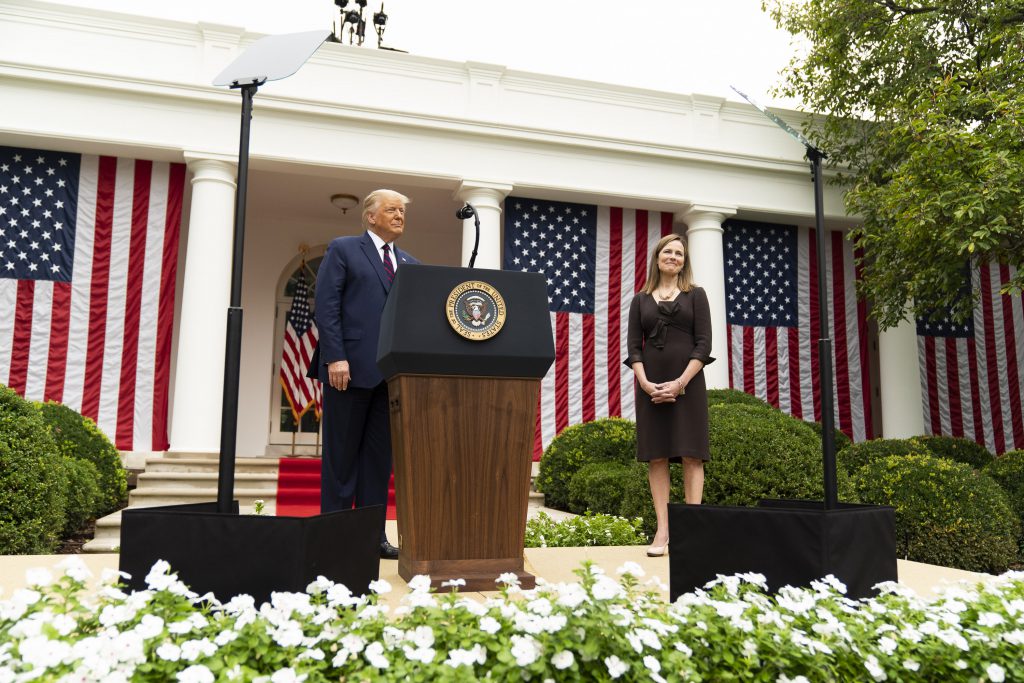What Amy Coney Barrett Forgot
Her omissions during testimony offer clear clues to the kind of justice she will be.

President Trump nominates Judge Amy Coney Barrett for associate justice of the U.S. Supreme Court. Official White House Photo by Shealah Craighead. (Public Domain).
Amy Coney Barrett is the latest in a long line of judges fond of calling themselves originalists. They claim that means their rulings are faithful to the original wording of the U.S. Constitution. They also like to call themselves textualists, meaning they are supposed to abide by the plain language of the law.
“Originalist” and “textualist” are marketing brands, not a judicial philosophy. Pledging allegiance to the Constitution and fidelity to the law sounds good, but the way these judges rule bears no relationship to the label they wear.
Judge Barrett was asked during hearings on Senate confirmation of her Supreme Court appointment if either the Constitution or federal law give the president the authority to delay an election. Both the Constitution and federal law are crystal clear on this question. The answer is no. The president has no such authority. Judge Barrett did not give that answer. She proved right then and there she is an originalist in name only.
The first doctrine is that money is speech. The First Amendment to the Constitution guarantees the right to free speech. The amendment is 45 words long. The word money is not one of those 45 words. The conclusion that money equals speech cannot be reached by sticking to the Constitution’s wording.
The second doctrine is that corporations are people or, more precisely, they are citizens with constitutional rights. If you read the entire Constitution, from the first word “We”—as in “We the People”—to the very last word of the 27th and final amendment to the Constitution, you will not find the word corporation. Corporate citizenship is a legal invention that is not rooted in any way in the phrasing of the Constitution.
Yet self-proclaimed “originalists” like Antonin Scalia and Clarence Thomas who formed the court majority in Citizens United nevertheless ruled that since money is speech and corporations are citizens, corporations have a constitutional right to spend as much as they want to influence our elections.
The infamous Citizens United decision revealed the canyon-sized gap between what these judges claim to be and what they really are. In reality, there are two kinds of judges. There are those who claim to be originalists but are actually obstructionists. They obstruct change, they work to keep power in the hands of those who’ve traditionally held power. And there are judges who are willing to grant permission for society to change, who open doors for those who’ve been on the outside looking in.
A telling moment in Judge Barrett’s confirmation hearings came when she was asked if she knew the five freedoms guaranteed in the First Amendment to the Constitution. She named four of them, but couldn’t remember the fifth. The one she forgot was the right of the people to protest, to petition our government for redress of grievances.
Mike McCabe is executive director of Our Wisconsin Revolution (ourwisconsinrev.com) and author of Unscrewing America: Hints and Hopes from the Heartland.
If you think stories like this are important, become a member of Urban Milwaukee and help support real, independent journalism. Plus you get some cool added benefits.
Op-Ed
-
Wisconsin Candidates Decry Money in Politics, Plan to Raise Tons of It
 Dec 15th, 2025 by Ruth Conniff
Dec 15th, 2025 by Ruth Conniff
-
Trump Left Contraceptives to Rot; Women Pay the Price
 Dec 8th, 2025 by Dr. Shefaali Sharma
Dec 8th, 2025 by Dr. Shefaali Sharma
-
Why the Common Council’s Amended Budget is Good Policy for Milwaukee
 Nov 20th, 2025 by Alds. Marina Dimitrijevic and Russell W. Stamper, II
Nov 20th, 2025 by Alds. Marina Dimitrijevic and Russell W. Stamper, II




















